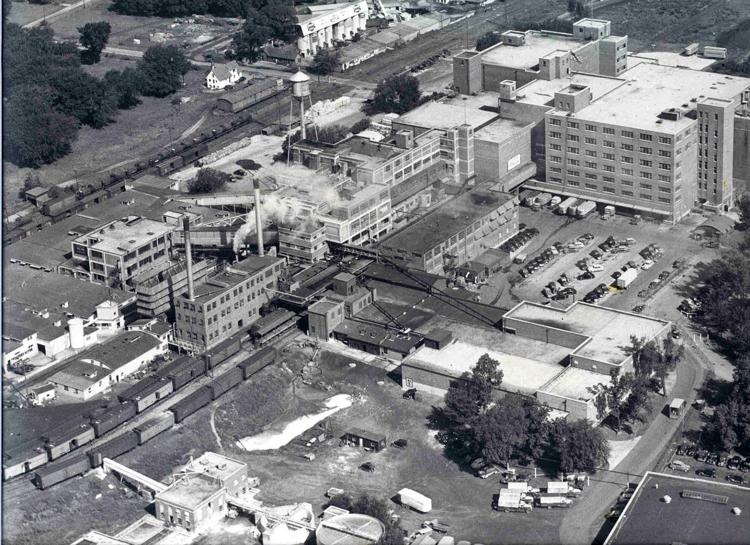Oscar Mayer site in 1947 (photo from Wisconsin State Journal)
Victory for Madison’s Northside! Madison’s Metro Transit authority has abandoned plans to buy the northern part of the highly-contaminated former Oscar Mayer plant for its bus garage. Instead, Metro is taking steps to purchase a FedEx distribution center near the airport to store buses.
Read Chris Hubbuch’s story about this change of plans in the Wisconsin State Journal.
Metro officials told the State Journal the change in plans–after years of planning to locate the bus barns at Oscar Mayer–was because the FedEx site is less expensive. It is less expensive because the cost doesn’t include cleaning up extensive toxic contamination, as the Oscar Mayer site does. There are also significant unknowns about how high this cost would be because the owner of the parcel, a partnership called Reich Brothers–Rabin Worldwide (Reich Rabin), won’t let the city test before purchase. Reich Rabin specializes in buying heavily contaminated industrial sites nobody else is willing to purchase and selling them for redevelopment.
But this is only a small part of the story. The city would prefer that the public and elected officials not know the whole story, because it raises critical questions about the city’s commitment (or lack thereof) to honest and open public engagement, social and racial equity, and environmental justice. It also illustrates how deeply broken our city and state’s environmental regulatory processes are.
If committed community activists who formed the No Bus Barns group (Beth Sluys, Dolores Kester, Chet Hermanson) and MEJO hadn’t fought tooth and nail to raise attention to the extent of toxic contamination at the Oscar Mayer site–and repeatedly highlighted the significant environmental health risks and injustices that would be created by placing the bus barn there–they would have been approved by city council and moving forward by now. Nobody would know how contaminated that site is, forget about any public discussion or engagement on it.
For the last two years, citizen activists and MEJO reviewed DNR documents, wrote letters, testified at public meetings, and talked with the community, alders and reporters. We demanded public engagement and transparency about the contamination. Beth Sluys wrote many excellent stories in the Northside News. We successfully challenged the “categorical exclusion” from National Environmental Policy Act (NEPA) laws that Metro was granted by the Federal Transit Authority.
See MEJO’s many letters to city officials and the FTA here.
What’s next? The bus barns won’t be at the Oscar Mayer site, but the site is still poisoned. The city still plans high density “affordable” housing on it and right next to it. Toxic chemicals from the site continue to ooze down stormwater and sanitary pipes into Starkweather Creek, the Yahara River, and Lake Monona.
Will DNR demand that the current owners, Reich Brothers – Rabin Worldwide, follow environmental laws requiring them to fully investigate and clean up the site? Will the city urge the DNR to make them do so? Will contaminant and vapor migration offsite be investigated, and any exposures to neighborhood residents be prevented?
Unfortunately, the track record isn’t good. If we want our government agencies to follow their own laws and assure that public health and the environment are protected–and race and class disparities in toxic exposures eliminated–Madison residents and elected officials will need to make a lot of noise demanding that they do so.

